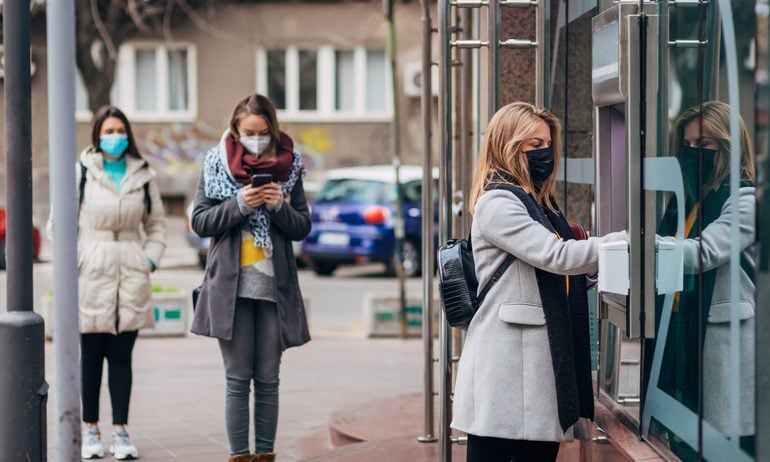Survey: Most Like Their Bank; What To Seek if You Don’t

Many, or all, of the products featured on this page are from our advertising partners who compensate us when you take certain actions on our website or click to take an action on their website. However, this does not influence our evaluations. Our opinions are our own. Here is a list of our partners and here's how we make money.
Do you like your bank? According to a new NerdWallet survey, just over half of American banking consumers (53%) say they’re very satisfied with their current primary bank — defined as the bank that they use most often — while others feel only somewhat satisfied (30%) or unsatisfied (17%) with this financial institution.
The NerdWallet survey of more than 2,000 U.S. adults — including 1,870 who have a primary bank — conducted online by The Harris Poll asked banking consumers about their satisfaction with their current primary bank. We also asked about which bank features/services are most important to them and whether banking with an ethical or socially responsible bank is a priority.
"Choosing a bank is a very personal decision, and no two banks are the same," says Chanelle Bessette, a banking specialist with NerdWallet. "It’s important to make sure you’re picking the right option for your lifestyle."
If your primary bank isn’t meeting your needs, consider these five things when choosing your next bank account, including the ethics of its business practices.
1. Functionality of online tools and services
According to the survey, online access (65%) and mobile apps (57%) are among the top services or features that banking consumers say are most important to them. Banking websites and apps are pretty standard these days, regardless of whether you choose an online-only or traditional brick-and-mortar bank. But if you’re looking to do your banking primarily online or through an app, opt for a bank or financial company with a good mobile banking experience.
"Online banks and neobanks — or financial tech companies that provide online banking services — tend to have streamlined apps with strong remote customer service options, so they’re a good option to check out if the mobile banking experience is a priority for you," Bessette says.
2. Access to human connection
Physical branches (56%) and phone customer service (53%) are two other features/services that are among the most important to more than half of banking consumers, according to the survey. This could suggest that some people prioritize access to humans who can assist with banking activities, whether it’s because they regularly need these services or they like having the option for peace of mind if they have a problem banking online.
If you want to use physical branches, then national banks, regional/local banks or credit unions are probably your best bet. Factor in whether you need branches where you live only or wider access due to frequent travel or relocation. Some online banks may have a few physical locations, which could give you branch access without losing the perks of online-only banks, such as user-friendly apps and higher interest rates.
Though most banks offer phone customer service, some may have more hoops to jump through to get to a person. If this is a priority for you, search for a bank’s customer service reputation and learn how to get access to a bank representative when wait times are long.
3. Interest rate potential
Generally, interest rates are a big part of the conversation when it comes to choosing where to open a savings account. But right now, interest rates are low across the board and might not seem worth your consideration.
Still, it’s likely interest rates will rise again, even if it’s not going to happen soon. If high interest rates are important to you, you’ll often find them at online-only banks, financial technology companies and credit unions. Check out what rates look like now. Even though they’re all low, the banks with the highest rates now are likely to have the highest rates later.
4. Free cash withdrawals
When asked to choose which banking features or services are among the most important to them, 59% of banking consumers chose fee-free ATM networks and 38% chose fee refunds for out-of-network ATMs, according to the survey. If you regularly need easy, free access to your cash, examine your bank’s ATM network and fees. Note though that some banks that offer refunds on ATM fees might have limits on how much they reimburse each month.
5. Ethical or social impact
Around a third of banking consumers (34%) count ethical practices as one of the most important banking services and features to them. But when asked how important it is that their primary bank is ethical or socially responsible, close to 4 in 5 banking consumers (78%) say it’s very or somewhat important. About a third of banking consumers (33%) want to switch to an ethical/socially responsible bank but aren’t sure how to find one.
When looking for an ethical or socially responsible bank, it’s important to first identify what this means to you. You might look at a bank’s social and economic impact mission, how it invests and lends out its deposits or how it supports your community to decide if its practices align with your values. For example, if your priority is racial economic equity, you might seek out a minority-owned bank — or minority depository institution — which requires that the majority of the voting stock is owned by members of minority communities, or the majority of the institution’s board of directors are part of minority groups and the community being served is predominantly minority individuals. If your primary concern is the environment, you might seek out a bank that divests from fossil fuels.
Not sure where to begin? Look into Certified B Corporations and the Global Alliance for Banking on Values. Certified B Corporations must meet high standards of social and environmental performance and public transparency, and members of the Global Alliance for Banking on Values follow a list of principles, including a focus on sustainability, serving the community and providing transparency in business practices. You can also check out Community Development Financial Institutions, or CDFIs, which aim to expand economic opportunity in low-income communities.
"There are quite a few FDIC-insured banks that have chosen to divest from fossil fuels as well as reinvest into socially conscious causes," Bessette says. "By working with a bank that has a social and environmental mission, you can have the added benefit of doing good in the world with your regular banking services."
Methodology
This survey of 2,019 U.S. adults ages 18 and older, including 1,870 who have a primary bank, was conducted online by The Harris Poll on behalf of NerdWallet from Oct. 12-14, 2021. This online survey isn't based on a probability sample so no estimate of theoretical sampling error can be calculated. For complete survey methodology, including weighting variables and subgroup sample sizes, contact Chloe Wallach at [email protected].

